News from the Zhu Group
On October 18, 2025, IU distinguished alum Dr. Peng Lu and Professor Chen Zhu gave a Short Course at the Geological Society of America’s Annual Meeting. The virtual event attracted about 50 participants from multiple countries.


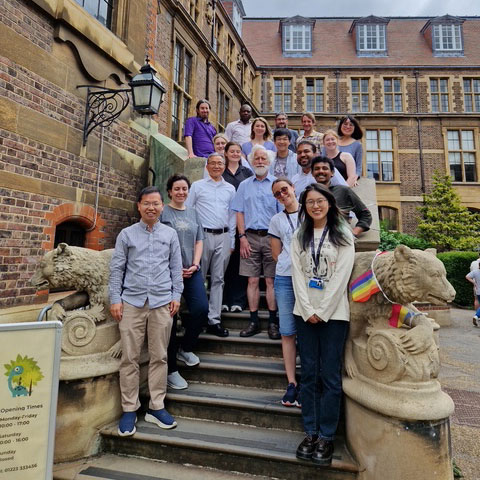
On June 26, 2025, Professor Chen Zhu gave a UK-wide Short Course at University of Cambridge. It is titled "Geochemical Modelling for Critical Minerals Research and Applications.” It is made possible by the Leverhulme Trust which funded Chen’s visiting professorship to Cambridge.
Master student Janie Cook Wittmer is going to present “A Basalt Dissolution and Clay Precipitation Study: Using Multiple Isotope Tracers to Close Knowledge Gaps in Enhanced Rock Weathering.”
Doctoral student Mingkun CHEN is going to present “Deciphering coupled labradorite dissolution and secondary precipitation reaction kinetics using multiple isotope tracers.”
Former Master student McKailey Sabaj, now a research hydrogeologist at the Indiana Geological and Water Survey is going to present “Geochemical kinetics of barium and sulfur isotope exchange between barite and 137Ba and 32S enriched solutions at solubility equilibrium.”
Undergraduate student Ranvir Singh Virk is going to present with Lei Gong “Science gateway of online geochemical programs for modeling CO2-water-mineral-H2S reactions from ambient to deep crustal temperature and pressure conditions.”
Read Lei and Ranvir's abstract
Post-doc associate Dr. Ruiguang Pan is going to present “Development of an internally consistent thermodynamic database for REE minerals and crystalline solids.”
Our distinguished alum, Dr. Peng Lu of Aramco is going to present with us “A Review of Basalt-CO2-Water System Laboratory Experiments: Knowledge Gaps and Research Needs from the Perspectives of Modeling.”
Find out when and where they will have a party and join us.
Website: https://www.mdpi.com/2075-163X/14/3/305
PDF Version: https://www.mdpi.com/2075-163X/14/3/305/pdf

McKailey Sabaj (MS, 2023) gave a poster “Novel applications of non-traditional stable isotopes to test the fidelity of barite paleo-environmental proxies” at the 2023 annual Geological Society of America conference in Pittsburgh.

Mingkun Chen (doctoral student, 2023-) gave a poster “Deciphering coupled dissolution and precipitation reaction kinetics using multiple isotope tracers” at the 2023 annual Geological Society of America conference in Pittsburgh.
8/17/2023, Chen Zhu gives a short course “Advanced Geochemical Modeling” at the International Association of Geochemistry’s tri-annual conference. About 60 participants from many countries attended.

6/20/2023, Chen Zhu gave an invited talk to the Australia Commonwealth Scientific and Industrial Research Organisation (CSIRO) symposium “Locking Carbon in Minerals Cutting Edge Symposium”.
6/16/2023: Chen Zhu gave a short course in the Department of Earth Science, University of Cambridge, UK “Advanced Geochemical Modeling”.
6/10/2023, Chen Zhu received a grant to work on CO2 removal and sequestration from NSF https://eri.iu.edu/news-and-events/_news/archive/2023/202306132023-iu-researcher-receives-nsf-award-to-study-carbon-trapping-mineral-systems.html
5/10/2023: McKailey Mary Sabaj graduated with a Master’s degree and landed a job with Indiana Geological and Water Survey.
5/1/2023: Pan Ruiguang joined Zhu’s group as a post-doc
3/1/2023, Chen Mingkun, a doctoral student, joined the Zhu’s group
12/2/22: EAWAG SEMINAR - Visiting researcher Chen Zhu: Around the world for good groundwater
Video: Darcy Lecture Hydrogeochemistry in the 21st century
Recording of 10 October 2022 with Prof. Chen Zhu at Eawag
Eawag Seminar - Hydrogeochemistry in the 21st century
December 2, 2022
Martina Huber
Geochemist Chen Zhu from Indiana University was at Eawag from August to October 2022 on sabbatical. His research interest is the chemistry of groundwater and water’s interaction with minerals and gases. He reports here on his stay at Eawag.
"How can our research on groundwater help reduce CO emissions? How can the desired transition from fossil fuels to green energy affect water quality? These are some of the questions that I am currently researching as a Professor of Earth Sciences at Indiana University in the USA.
As a geochemist, I am interested in the chemistry of water, the interactions of water with minerals and gases, and how we can predict these complex interactions using models.
One possibility to limit global warming is to store CO in geological layers containing groundwater, so-called aquifers. This is why it is so important that we better understand the chemical reactions that take place when water, CO and minerals meet.
CO injected into an aquifer acidifies water, resulting in an acidic, corrosive fluid that dissolves some minerals out of the rock causing others to precipitate out of the water. If CO is precipitated in the form of minerals, it is bound to the rocks and can no longer escape back to the atmosphere. This process is called CO mineralization.
This also reduces the risk of CO leaking into overlying aquifers that are used for drinking water production. Because when this happens, CO can acidify our drinking water and dissolve trace metals, such as lead or arsenic from the rock – problematic substances that we do not want in our drinking water.
Geochemists have studied these interactions for at least a century, but society’s need for climate change mitigation has raised a new challenge. Our chemical kinetics research of CO mineralization will help us to develop more accurate geochemical models of this mineralization and, thus, to contribute to the global implementation of CO storage in aquifers.
During my visit in Switzerland, I did not work on any specific Eawag project. The US Groundwater Foundation has selected me as the Henry Darcy Distinguished Lecturer for 2021 and 2022, and I have given 65 talks so far: 35 online and 30 in-person, at universities, government agencies and research institutions around the world. In Switzerland, I gave lectures at Eawag, PSI, and the universities of Basel and Neuchâtel. It was a great honor for me.
Henry Darcy was a 19th-century French engineer who discovered the Darcy’s Law, named after him, that explains fluid flow in soils and rocks. Darcy also devoted his life to public service. The work and life of Henry Darcy are still an inspiration for students around the world.
I enjoyed my stay here at Eawag and in Switzerland. It was a great opportunity for me. Eawag is one of the world's leading research institutions in water science and technology. My numerous discussions with colleagues here at Eawag and at other Swiss research institutions have brought me new ideas that will guide my research for years to come.
I will continue my sabbatical leave until August 2023. Before returning to my home university, I will first visit the University of Cambridge for three months and then go to Australia for six months, to universities in Perth and Melbourne."
Last Change: December 1, 2022
Michael Berg (https://www.eawag.ch/de/ueber-uns/portraet/organisation/mitarbeitende/profile/michael-berg/show/)
BU C13 Tel. +41 58 765 5078
Infoletter360°insight (/en/communications/newsevents/infoletter-360-insight)
5/6/2022: Undergrad Rob Hageboeck successfully graduated from IU.
Lei Gong gave him a celebration party at her home. Rob has maintained the geochemical modeling science gateway and developed several geochemical modeling tools.
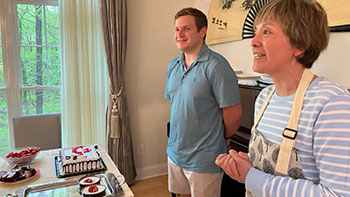
4/19/2022: Grad student McKailey Sabaj published her first paper.
Grad student McKailey Sabaj published her first paper ever together with computer science doctoral student Nicholas Majeske, USDA scientist Xuesong Zhang, Lei Gong, Chen Zhu, and Professor Ariful Azad
Link: https://www.sciencedirect.com/science/article/pii/S1364815222001062?via%3Dihub
2/10/2022: Dr. Chen Zhu Henry Darcy Lecture
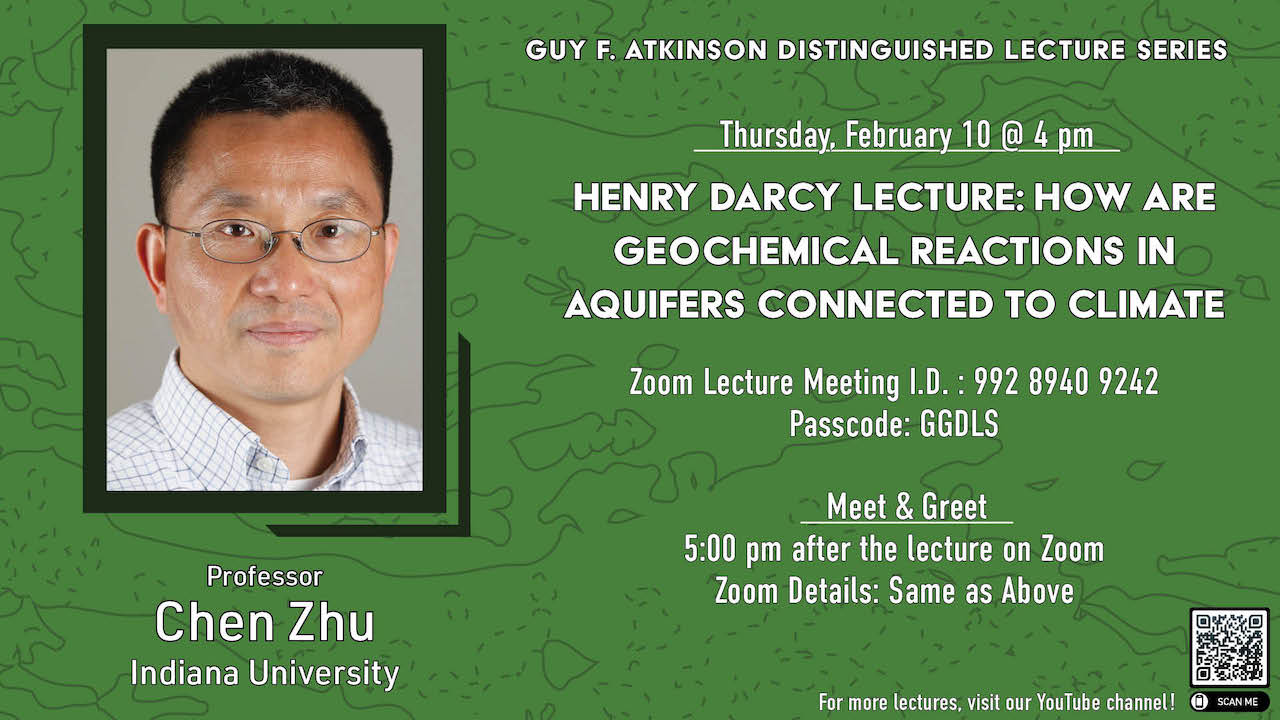
Title: How are geochemical reactions in aquifers connected to climate?
Zoom lecture meeting ID: 992 8940 9242
Passcode: GGDLS
Meet & Greet: 5:00 pm after the lecture on Zoom
12/15/21: Chen Zhu gives the Henry Darcy Distinguished lecture at NGWA Groundwater week
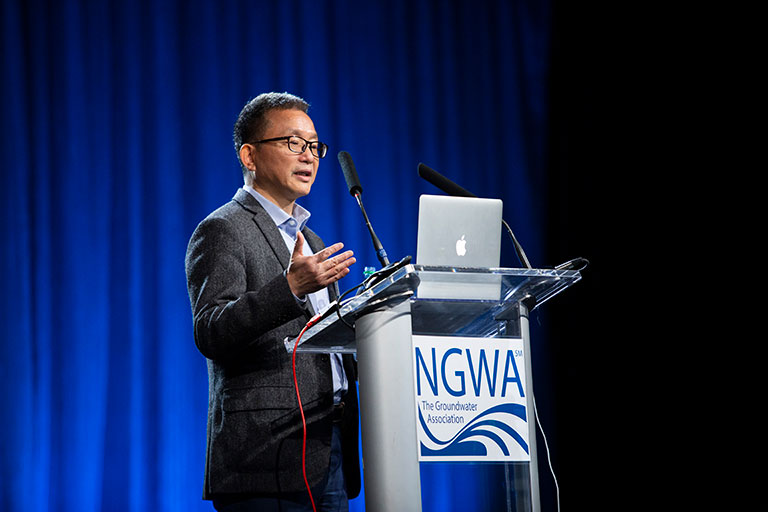
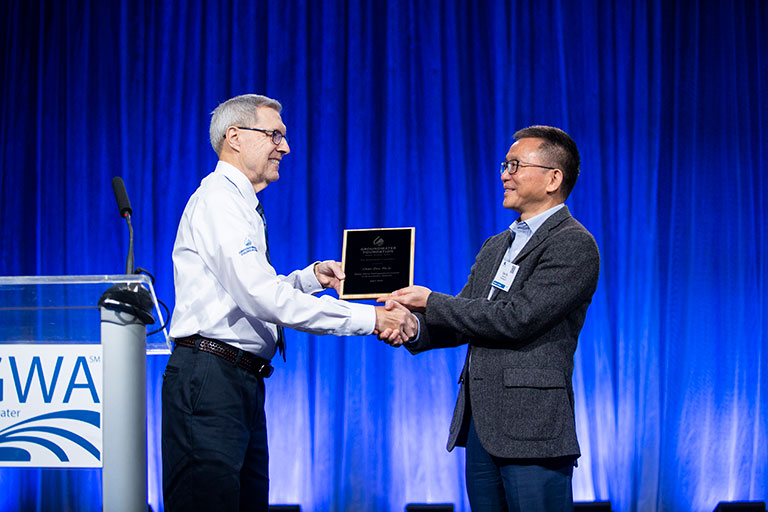
Chen Zhu gives the Henry Darcy Distinguished lecture at NGWA Groundwater week on December 15, 2021.
2-3 July 2021, Peng Lu and Chen Zhu gave a virtual short course titled, “Advanced Geochemical Modeling.” About 348 attendees from 44 countries participated. Read about the short course
On 21 June 2020, we will conduct a virtual workshop at this year’s Goldschmidt conference. Click here for more info
4/13/2020 Article on ScienceNode
An article on ScienceNode about Chen Zhu's FutureWater project. Indiana will get more rain, especially during the winter, but still have drier soils due to higher temperatures and greater evapo transpiration.
4/6/2020: Dr. Zhu gave a webinar
“FutureWater.indiana.edu - A science gateway for research, teaching, and service to society”. Click here for the webinar https://www.youtube.com/watch?time_continue=557&v=3eM7RcPYEJU&feature=emb_logo
80 to 100 people from state agencies (Natural Resources, Environmental Mgmt, Financial Authority, Homeland Security, Health, Utility Regulatory Commission, Geological and Water Survey, State Climate Office), federal agencies (NOAA, USDA, Forest Service, Weather Service), NGOS, and private industries (Cummins, American Water, Citizens Energy, Comcast, consulting firms), and municipalities participated in the webinar.
2/26/20: Climate change will threaten Indiana's water supply
26 February 2020, IU’s radio (WFIU) and TV (WTIU) interviewed Chen Zhu about the group’s hydrological model of the Wabash River Watershed: “Climate change will threaten Indiana's water supply”
18 February 2020: IU student newspaper Indiana Daily Student published an article IU researchers create map showing how climate change affects water availability about the group’s work on modeling the Wabash River Watershed.
12 February 2020: IU media news release. Here is what our chair Professor David Polly said “If you have not seen it, FutureWater was just released by Chen Zhu and his group. Visitors to the site can learn about precipitation, groundwater recharge, streamflow and water yield in the Wabash drainage (which includes most of the state of Indiana) and interactively explore projections over the 21st century under two different climate change models. The project was funded by the Prepared for Environmental Change grand challenge and the Environmental Resilience Institute (ERI). Related work on arsenic contamination in Indiana ground water will carry forward in IU's Center for Rural Engagement.”
20 January 2020. A new paper “Drought in the Twenty-First Century in a Water-Rich Region: Modeling Study of the Wabash River Watershed, USA” is published in the journal Water. Link
7 January 2020. A new paper “Decoupling feldspar dissolution and precipitation rates at near-equilibrium with Si isotope tracers: Implications for modeling silicate weathering” is published in Geochimica et Cosmochimica Acta. This work is funded by the National Science Foundation and OVPR. Link
19 December 2019. A new article “Effects of natural gas acidic components on local porosity generation in a carbonate reservoir: Insights from reactive transport modeling” is published in AAPG Bulletin. Link. This work is funded by the American Chemical Society/ Petroleum Research Fund.
7 -10 December 2019. Three presentations were given at Fall AGU.
13 November 2019. A new paper “A method for Si isotope tracer kinetics experiments: Using Q-ICP-MS to obtain 29Si/28Si ratios in aqueous solutions” is published in Chemical Geology. This work is funded by the National Science Foundation and OVPR. Click here.
15 September 2019. A new paper “Unidirectional kaolinite dissolution rates at near-equilibrium and near-neutral pH conditions” is published in Applied Clay Science. This work is funded by the National Science Foundation and OVPR. Click here.
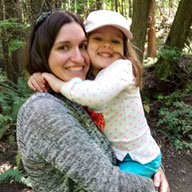
1 September 2019. Post-doctoral associate Jennifer Brand has landed on a tenure track assistant professor job at the University of Wisconsin – Stevens Point. Congratulations, Jennifer!
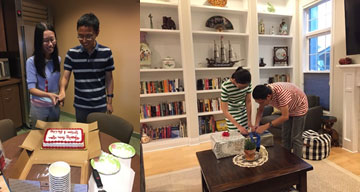
1 May 2019. Doctoral student Yilun Zhang successfully defended his dissertation. Congratulations, Dr. Yilun Zhang! Image: Yilun's wedding reception in Dr. Zhu's home in 2016

